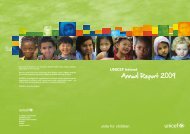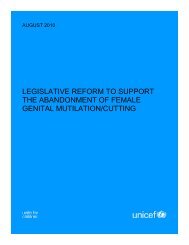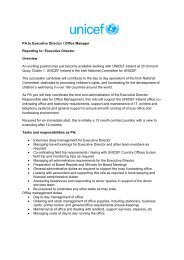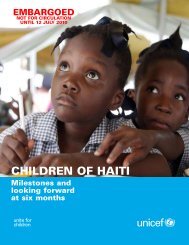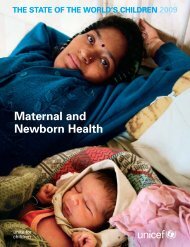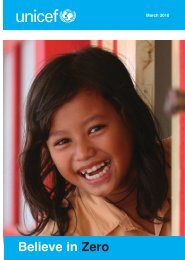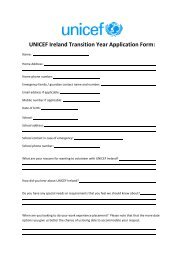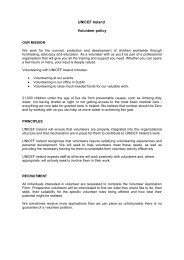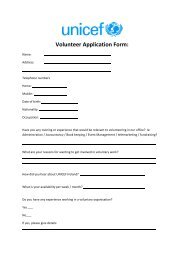Humanitarian Action for Children 2011 - Unicef
Humanitarian Action for Children 2011 - Unicef
Humanitarian Action for Children 2011 - Unicef
- No tags were found...
You also want an ePaper? Increase the reach of your titles
YUMPU automatically turns print PDFs into web optimized ePapers that Google loves.
West and Central Africa<strong>Children</strong> and women in crisis<strong>Humanitarian</strong>funding at work:Highlights from 2010UNICEF estimated thatUS$40,025,300 was neededto fund its humanitarian workin West and Central Africa in2010. As of October 2010, atotal of US$4,911,757 had beenreceived, representing 12 percent of the goal. Nonetheless,UNICEF developed regionalsupply hubs in Douala andAccra to ensure rapid deliveryof ready-to-use therapeuticfood <strong>for</strong> the Sahel nutritioncrisis. Over US$1 million wasraised via the ConsolidatedAppeals Process (CAP) tovaccinate 1,178,000 peopleagainst meningitis andincrease vaccine stocks inChad and Burkina Faso.Regional emergency fundswere deployed <strong>for</strong> the firstphase of flood interventionsin Benin and Burkina Fasoand <strong>for</strong> pre-election preparednessin the Central AfricanRepublic and Guinea. Regionalteams provided training onminimizing school disruptionsduring emergencies <strong>for</strong>government and NGO partnersand country office staff (Benin,Gambia, Ghana, Mauritania,Senegal, Sierra Leone andTogo) and on protectingchildren separated fromfamilies in displacements <strong>for</strong>police <strong>for</strong>ces and governmentpartners (Chad, Côte d’Ivoire,Ghana, Senegal, Sierra Leoneand Togo).Life in West and Central Africa is marked by chronic poverty, recurringfood insecurity and poor diets that have left a generation of childrenundernourished. Cyclical drought, severe pressure on limited naturalresources and outdated farming practices cripple food production inthe Sahel region; in 2010, nearly 10 million people faced a seriousfood crisis, while 859,000 children under 5 years old needed treatment<strong>for</strong> severe acute malnutrition. 1 Natural and human-made hazards multiplythese needs and have taken a toll on infrastructure and accessto basic services, hastening the spread of epidemics: during 2010,cholera, meningitis, measles and polio epidemics occurred in at least20 countries in the region. The death rate among infants and childrenunder age 5 in West and Central Africa is the highest in the world, 2 andmore than a dozen countries in the region rank at the bottom levels ofthe Human Development Index. 3Meeting urgent needs and building resilience in <strong>2011</strong>UNICEF’s West and Central Africa Regional Office will continue to provide technical, coordinationand planning support to help country offices assist millions of vulnerable people throughoutthe region. The regional office will also distribute funds to country teams in several countriesto cope with ongoing, smaller-scale emergencies that nevertheless require a coordinatedresponse and adequate resources.• To enhance disaster risk reduction, an emergency regional fund will be established and usedto increase surge capacity and maintain regional supply hubs in Douala, Cameroon, and theUN <strong>Humanitarian</strong> Response Depot in Accra.• The regional office will monitor nutrition conditions by providing assistance withmethodology, training or analysis <strong>for</strong> at least one nutrition survey, using SMART (specific,measurable, achievable, relevant and time-bound) methods, in each country.• Technical support will bolster assistance to governments trying to control outbreaks ofmeningitis, cholera and measles. To have vaccine stocks ready, UNICEF will map areas athigh risk <strong>for</strong> cholera, focusing on the central area (Cameroon, Chad, the Niger and Nigeria),and the coastal area (Benin, Guinea, Guinea-Bissau and Togo).• UNICEF will develop home-based water treatment and storage strategies. The regionalteam will rein<strong>for</strong>ce national and local preparedness by promoting hygiene, includingadequate hand-washing practices and water treatment strategies in areas at high risk<strong>for</strong> cholera.• In anticipation of a potential humanitarian crisis resulting from the referendum in SouthernSudan, country offices in the Central African Republic, Chad and the Democratic Republic ofthe Congo are updating their multi-hazard preparedness plans based on UNHCR planningfigures. The regional office is seeking funding to pre-position emergency supplies and deploysurge resources <strong>for</strong> the early phase of any potential emergency response.• The West and Central Africa Regional Office will channel funds and surge resources tosupport country offices as they coordinate emergency response, with a focus on rapidonsetemergencies, particularly in countries without access to resources through a separate<strong>Humanitarian</strong> <strong>Action</strong> <strong>for</strong> <strong>Children</strong> appeal.60 <strong>2011</strong> UNICEF <strong>Humanitarian</strong> <strong>Action</strong> FOR CHILDREN | www.unicef.org/hac<strong>2011</strong>




